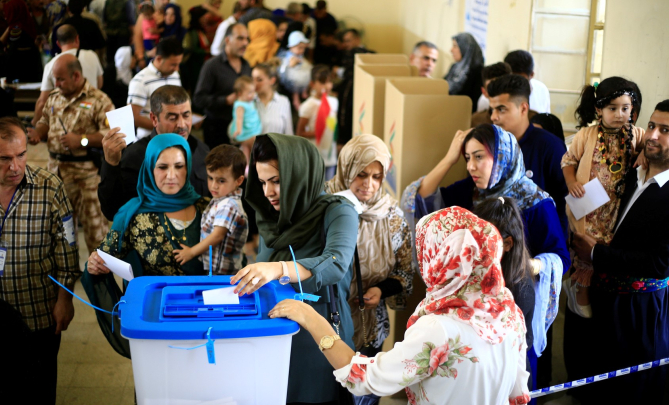Overview
The EU's commitment to democracy is a key component of its foreign policy Treaty on European Union - Article 21 (2007), and inextricably linked to fundamental values of human rights and the rule of law. This commitment is reflected in the EU Council Conclusions and Agenda for Action on Democracy Support (2009), the Agenda for Change (2011) and most recently the New European Consensus on Development (2017). The European Consensus on Development commits the EU to promoting 'the universal values of democracy, good governance [...] because they are preconditions for sustainable development and stability.' Democracy is thus identified as key to achieving all the Sustainable Development Goals, although it is given specific prominence in SDG 16.
There is no consensus on what is meant by democracy, although most agree that 'free and fair' elections and related political freedoms are essential elements.
EU Democracy support has traditionally focused on four areas: (i) inclusive, transparent and credible electoral processes; (ii) constitutional reform and democratic institutions; (iii) political and civil society and (iv) promotion of fundamental freedoms.
The proposed democracy results chain is a practical tool that aims to support INTPA staff in the design of interventions in line with the New Consensus on Development, and in support of the SDG's.
The results chain takes a Rights Based Approach at output level, focusing on both rights holders and duty bearers. Outputs can be categorised into support for the following broad areas:
- Civil society,
- Participation in key policy areas,
- Independent media,
- Fundamental freedoms,
- Oversight bodies and accountability,
- Parliaments and political parties,
- Electoral management bodies and the electoral process,
- Legal identity services.
The above components are crucial for contributing to the following results at outcome level:
- Enhanced enabling environment for civil society,
- Increased participation of CSO's in tackling climate change, youth inclusion, irregular migration, forced displacement, women's participation in decision-making, and mitigating risks and vulnerabilities in fragile and conflict-affected countries,
- Effectiveness of CSO advocacy strengthened with participation in development policy debate and oversight, including for SDG implementation,
- Enhanced enabling environment for the media to operate without interference,
- Enhanced constitutional and legal framework for independent work of oversight bodies, including Parliament,
- Improved effectiveness of Parliamentary functions,
- Improved contributions of political parties to democratic processes,
- Political party system is conducive to political participation,
- Increased public participation, including of women and underrepresented groups, in the overall democratic process,
- Improved electoral operational efficiency, integrity and accuracy of electoral processes,
- Increased rates of registration for legal identity.
Those six main results are crucial for improving (i) trust in representative democracy, (ii) transparency and accountability of democratic institutions, and (iii) inclusiveness of the democratic process. The ultimate aim at impact level is to foster a functioning, pluralistic, participatory and representative democracy. This results chain and the list of proposed indicators are a practical tool that will need to be adapted to the specific context and circumstances of each country and intervention. They do not aim to be exhaustive and in several cases will have to be used in complementarity with other results chains, such as those on justice and the rule of law, human rights, anti-corruption, SSR etc. This results chain and the list of proposed indicators also aim to be an interactive tool, to be adapted and improved over time taking into consideration the feedback of its users.
Policy and Strategic Documents
- Neighbourhood, Development and International Cooperation Instrument (NDICI) (2021)
- Action Plan on Human Rights and Democracy (2020-2024)
- GAP III objectives and indicators (SWD2020 - 284 final)
- Council Conclusions on Democracy (2019)
- New European Consensus on Development (2017)
- Shared Vision, Common Action: A Stronger Europe - A Global Strategy for the European Union’s Foreign And Security Policy (2016)
- EU Strategic Framework and Action Plan on Human Rights and Democracy (2012)
- Council Conclusions and Agenda for Action on Democracy Support (2009)
- Treaty on European Union - Article 21 (2007)
- Commission Communication on EU Elections Assistance and Observation (2000)
